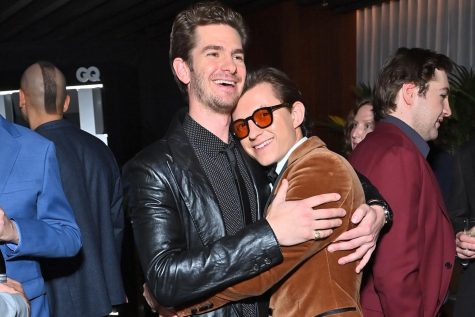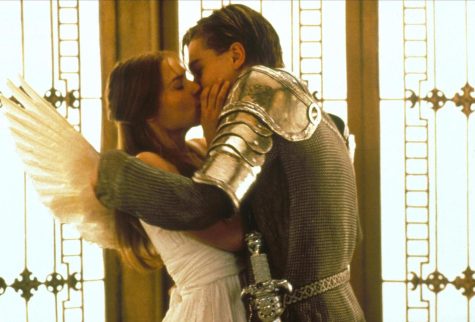Your nostalgia sells and the media is preying on it
Feb 25, 2022
This article is the second installment of a two part series on nostalgia and media pandering. For part one, released on Feb. 24, click here.
*WARNING: SPOILER ALERT FOR SPIDERMAN: NO WAY HOME*
“Spider-Man: No Way Home,” a previously reported topic on The Carroll News, became the top grossing movie in 2021 and one of the most profitable movies of all time just within a week of its release. Before the premiere of the movie, older fans of Marvel were intrigued by the trailer that showed their favorite villains from the Sam Raimi and Marc Webb Spider-Man sagas. They also began to circulate rumors about their favorite Spider-Men, Tobey Maguire and Andrew Garfield, making a reappearance. Audiences were hoping for a taste of their past and it is exactly what they got; it is the reason people still talk about the film’s success months later.

“When Andrew Garfield exited his portal, entering the world of the MCU, I felt like I was 11 again and just filled with boyish excitement that is hard to come by,” Max Malley ‘24 told The Carroll News. “It was a perfect love-letter to any fan of Spider-Man, regardless of what era, and it was an absolute pleasure to watch it unfold on the big screen. Bringing back the past Spider-Men and their villains added another dimension that just can’t be beat.”
If you ask movie-goers why they wanted to watch the movie, you will probably get one of two answers: “it is showcasing my favorite characters from my childhood” or “it is a Marvel movie.” Even if Doctor Otto Octavius (portrayed by Alfred Molina) and Norman Osborn (played by Willem Dafoe) did not make an appearance, people still would have watched because it is based on the Marvel comics and extends the Marvel Cinematic Universe. Subconsciously, you think about your past with these films and become joyful triggering that sweet sense of nostalgia. The directors know this and pander to it; Stan Lee knew this when he was creating the MCU in the first place. When you extend an original storyline, you get people tuning in to see how that story ends.
“My love of Marvel is simple,” Malley continued. “Those movies make me feel like the world is full of possibility and hope and that even the most impossible of outcomes can come true. My favorite Marvel movie is what I consider to be the ultimate compilation of a dream come true: ‘Avengers: Endgame.’ ‘Endgame’ wraps up 11 years of world-building and character arcs, closing the chapter on characters we’ve grown to love.”
The question then emerges: is using nostalgia as a tool for increasing sales a bad thing? A common gripe with reboot culture is that it can ruin something many deem to be ”perfectly good.” Mike Burdge, a professional curator and Editor-in-Chief at Story Screen, gives the example of “The Last Jedi” in the “Star Wars” universe claiming that people feel an ownership over the original films and do not want them to be “ruined.”
Many also argue that using nostalgia or constructing reboots and sequels is malpractice for creation in the first place. It is easier for directors and producers to churn out something of the same name without as much work and still receive revenue.
“In the world of big budget filmmaking, new is a risk,” Burdge states. “It’s no surprise that the things we like will be used to sell products being created specifically for the sole purpose of selling as many of them as possible. That’s how making money works. Memories are a very easy product to market and sell, as your investment in them is already sewn in; they barely have to try and sell you this stuff.”
On the other hand, it is still possible that these directors can create these films while still putting in as much new energy as their predecessors. Others frankly just enjoy partaking in nostalgia without arguing the ethics behind it. Why argue with the creation of a product if it is one that everyone enjoys? Should other movies be to blame for using Hans Zimmer’s emotionally wrenching scores just because they cause a sense of urgency or action? Proponents of reboot culture offer the claim: emotions are fair game for film and nostalgia falls into that category.
“My memories of these films, as well as my anticipation of future works, will always rely on my nostalgic nature as a viewer, because a film is equally about what the viewer brings to the table, as is the story and how it is executed,” Burdge continued.
However, even if you decide whether or not you believe nostalgia inducing films are malpractice, you are faced with a question: why do some reboots fail and others succeed? Do some not trigger enough past longing? Is it a budget issue? Dr. Mary Beadle, a professor in the Tim Russert Department of Communication, says that the rise or failure of a reboot or sequel all boils down to one thing: the story.

“That’s why we see patterns of storytelling over time,” Beadle said. “It’s the same story, look at how many times ‘Romeo and Juliet’ has been retold. So why?
Because it’s a story people are interested in, and you can do all kinds of variations on it. So if you don’t have a good story, nobody’s gonna pay attention to right. And the companies know, if they have a winning formula, to keep it right until people get tired of it.”
In the end, Hollywood will continue to create and recreate your favorite stories; it is impossible to stop as long as we, as consumers, chase the emotions that come with film. Perhaps the argument should not be if reboots and sequels are just but rather if, like Beadle says, they tell the best story they can. Maybe the only way to judge the content you view is if it is the only piece that matters and let the narrative speak for itself, looking for those positive feelings as a sign of a good product.
Laken Kincaid is a sophomore Campus Editor from Beckley, West Virginia. They can be reached via email at lkincaid24@jcu.edu or through Twitter at @lakengkincaid.












